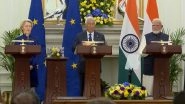New York [USA], Sept 29 (ANI): India's External Affairs Minister (EAM) Sushma Swaraj on Saturday used the United Nations platform to highlight the serious issue of Pakistan-sponsored cross border terrorism and human rights violations by killing security personnel in India.
Speaking at the 73rd session of the United Nations General Assembly (UNGA), Swaraj said that it has become Pakistan's habit to throw the dust of deceit and deception against India in order to provide some thin cover for its own guilt. The Foreign Minister clarified that while India is blamed for stalling talks with Pakistan, no dialogue with it can be possible in the midst of terrorist bloodshed and violence.
While terming terrorism as an existential threat to humanity, Swaraj said while the killers of 9/11 terror attack in the US met their fate, the mastermind of 26/11 terror attack in Mumbai, Hafiz Saeed, is freely roaming in the streets of Pakistan with impunity and giving hate speeches against India and challenging it.
"We imagined that the arrival of the 21st century would bring with it an age of common good, defined by cooperation in the quest for peace and prosperity. But here in New York, the horrific tragedy of 9/11, and in Mumbai the catastrophe of 26/11 became the nightmares that shattered our dreams. The demon of terrorism now stalks the world, at a faster pace somewhere, a slower pace elsewhere, but life-threatening everywhere. In our case, terrorism is bred not in some faraway land, but across our border to the west. Our neighbour's expertise is not restricted to spawning grounds for terrorism; it is also an expert in trying to mask malevolence with verbal duplicity," Swaraj said.
"The most startling evidence of this duplicity was the fact that Osama Bin Laden, the architect and ideologue of 9/11 was given safe haven in Pakistan. America had declared Osama bin Laden it's most dangerous enemy, and launched an exhaustive, worldwide search to bring him to justice. What America perhaps could not comprehend was that Osama would get sanctuary in a country that claimed to be America's friend and ally: Pakistan. Eventually, America's intelligence services discovered the truth of this hypocrisy, and its special forces delivered justice. But Pakistan continued to behave as if nothing had happened. Pakistan's commitment to terrorism as an instrument of official policy has not abated one bit. Neither has its belief in hypocrisy. The killers of 9/11 met their fate; but the mastermind of 26/11 Hafiz Saeed still roams the streets of Pakistan with impunity," EAM said.
She added that it was heartening to note that the world is no longer ready to believe Islamabad, and in this regard she mentioned the Financial Action Task Force (FATF) putting Pakistan on notice over terror funding.
Clarifying why the proposed Foreign Minister meeting between India and Pakistan was called off by New Delhi, Swaraj said: "We are accused of sabotaging the process of talks. This is a complete lie. We believe that talks are the only rational means to resolve the most complex of disputes. Talks with Pakistan have begun many times. If they stopped, it was only because of Pakistan's behaviour. There have been many governments in India, by many different parties. Each government has tried the peace option."
She asserted her government has made several attempts to diffuse tension with Pakistan and make a fresh beginning but each time, things have gone back to square one.
"Prime Minister (Narendra) Modi, by inviting the Heads of the SAARC nations, to his swearing in ceremony, began his attempt for dialogue on his very first day in office. On 9th December 2016, I personally went to Islamabad and offered a comprehensive bilateral dialogue. But soon after, Pakistan sponsored terrorists attacked our Air Force base in Pathankot on 2nd January. Please explain to me how we could pursue talks in the midst of terrorist bloodshed? Even now, after the new government came to power, Prime Minister of Pakistan Imran Khan wrote to Prime Minister Modi suggesting a meeting between Foreign Ministers in New York. We accepted the proposal. But, within hours of our acceptance, news came that terrorists had killed three of our jawans. Does this indicate a desire for dialogue?" EAM said.
She added that while Pakistan has been making noise about human rights violations in India, it is actually the neighbouring country that is the biggest violator of human rights.
"Time and again, Pakistan accuses India of human rights violations. Who can be a greater transgressor of human rights than a terrorist? Those who take innocent human lives in pursuit of war by other means are defenders of inhuman behaviour, not of human rights. Pakistan glorifies killers; it refuses to see the blood of innocents. It has become something of a habit with Pakistan to throw the dust of deceit and deception against India in order to provide some thin cover for its own guilt. The United Nations has seen this before. Last year, Pakistan's representative, using her right to reply, displayed some photographs as 'proof' of 'human rights violations' by India. The photographs turned out to be from another country. Similar false accusations have become a part of its standard rhetoric," the minister said.
She underlined the need for a comprehensive international law to check terrorists and their protectors and called for urgently implementing India-initiated Comprehensive Convention on International Terrorism (CCIT).
"In 1996, India proposed a draft document on CCIT at the United Nations. Till today, that draft has remained a draft, because we cannot agree on a common language. On the one hand, we want to fight terrorism; on the other, we cannot define it. This is why terrorists with a price on their head are celebrated, financed and armed as liberation heroes by a country that remains a member of the United Nations. Cruelty and barbarism are advertised as heroism. The country prints postage stamps glorifying terrorists. If we do not act now, we will have to deal with conflagration later. Once again, I appeal to this august body to come to an agreement, soon, on CCIT as one of the necessary measures in a long running war (against terrorism)," Swaraj emphasised.
Talking about other issues like Sustainable Development Goals (SDG), Swaraj said that though there has been a common refrain that the targets could be met only if India finds its way to this destination, she assured that India will never let the world efforts fail. In this regard, she mentioned several initiatives taken by the present Indian government under the leadership of Prime Minister Narendra Modi.
"India has initiated unprecedented economic and social transformation that will help India achieve its SDG much before time," Swaraj said as she counted several flagship programmes of the government that are helping in poverty elimination, social transformation, and financial inclusion.
She mentioned the Jan Dhan Yojana under which 320 million Indians have been introduced to formal banking system; health insurance programme -- Ayushman Bharat-that will benefit 500 million Indians, who will get an insurance cover of Rs 5 lakh per family per year; Prime Minister Housing Scheme that will ensure homes to nearly 21 million people by 2022; Mudra Scheme to provide easy loans to small entrepreneurs, particularly women; skill development, etc. She also mentioned special benefit programmes for women like the Ujjawala scheme, under which 50 million free gas connections have been provided, and the Maternity Benefit Scheme under which a woman gets 26 weeks of paid leave for childcare.
Terming Climate Change as one of the biggest challenges, Swaraj underlined that it is under-developed and developing nations that are the worst victims of Climate Change. "They have neither the capacity nor the resources to meet this crisis. Those who have exploited nature for their immediate needs cannot abdicate their responsibilities. If we have to save the world from the adverse effects of Climate Change, then developed nations must lift the deprived with financial and technical resources. The principle of common and differentiated responsibilities and respective capabilities was reiterated in the 2015 Paris Agreement," the minister said.
In 2017, United States President Donald Trump had walked out of the Paris Agreement on Climate Change saying it will have a huge impact on the US economy as the country was expected to pay a significant amount of money for the Green Climate Fund.
While elaborating India's efforts to meet the challenge of Climate Change, Swaraj highlighted the International Solar Alliance launched jointly by India and France that has 68 nations as members.
Swaraj also stressed for reforms in the United Nations Security Council. "Step by slow step, the importance, influence, respect and value of this institution is beginning to ebb. It is time to wonder if we are wandering towards the fate of the League of Nations. If 2030 is the agreed deadline for delivery on SDG, then it also marks hundred years of the lapse of the League into irrelevance. Surely there is something to learn from this coincidence. The League went into meltdown because it was unwilling to accept the need for reform. We must not make that mistake. The UN must accept that it needs fundamental reform. Reform cannot be cosmetic. We need to change the institution's head and heart to make both compatible to contemporary reality," said EAM while underscoring urgent need for reforms.
"If the UN is ineffective, the whole concept of multilateralism will collapse. In this session, there has been much debate about multilateralism. We will never weaken the multilateral mechanism. India believes that the world is a family, and the best means of resolution is shared discourse...India does not believe that the UN should become the instrument of a few at the cost of many. India believes that we must move forward together or we sink into the swamp of stagnation," she added.
Swaraj concluded by saying: "We have to make this assembly into a platform of understanding, assistance and true justice. We have to understand the pain of other nations, and work with developed nations to ease and eliminate this pain. Arrogance has no place in our scheme of things; arrogance is counter-productive and self-defeating. Let us work for the benefit of the less fortunate. Let us work for a world where there is peace, serenity and shared prosperity; a world that is free from terrorism, tension and violence." (ANI)
(The above story is verified and authored by ANI staff, ANI is South Asia's leading multimedia news agency with over 100 bureaus in India, South Asia and across the globe. ANI brings the latest news on Politics and Current Affairs in India & around the World, Sports, Health, Fitness, Entertainment, & News. The views appearing in the above post do not reflect the opinions of LatestLY)













 Quickly
Quickly


